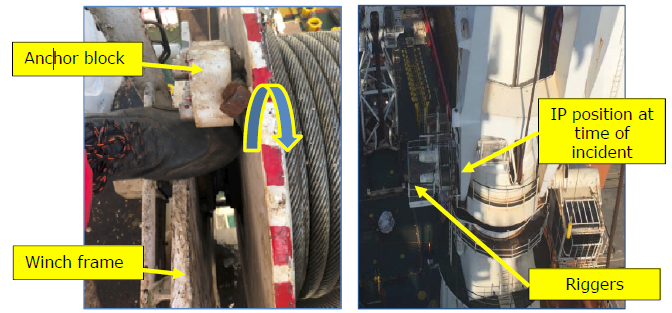Serious Injury from Rotating Winch
What happened?
A person involved in spooling a wire onto the main crane forward tugger winch drum suffered a serious foot injury. To facilitate the operation, he positioned himself in a restricted space inboard of the winch and opposite to the supporting riggers on the crane tugger platform. When he decided to leave this location, he placed his left foot on the winch frame to help step over a protrusion. This resulted in his foot being placed directly into a line of fire position, extending beyond the handrail. The anchor block, fitted to the outside of the still rotating winch drum, struck the extended boot which resulted in all five toes being amputated.

What went wrong? What were the causes?
Our members’ findings were that:
- The task risk assessment (TRA) was inadequate for the work and did not recognise hazards associated with rotating equipment during the spooling operation;
- The TBT did not discuss positioning for the personnel involved in the task, and did not emphasise the rotating block as a hazard;
- The rotating anchor block was unguarded as it was thought to be safe and barriered by the handrail;
- Safer options were available to the work team but not taken;
- There had been no time pressure to complete the task.
Our member took the following actions:
- Conducted a ‘hazard hunt’ on winches to identify further potential line of fire hazards;
- Re-assessed the effectiveness of the existing safety controls (safe use of work equipment), barriers, implemented required improvements and reporting findings back to shore-side management;
- Reinforced importance of specific risk assessments, effective TBT preparation and delivery for every activity, and the importance of last-minute risk assessment at work-site to ensure that all hazards have been identified prior to work starting;
- Reiterated importance of ‘Stop Work Authority’.
Members may wish to refer to:
- Toolbox talks (‘Be prepared to work safely‘ video)
- Toolbox talks (IMCA SEL 026) (video)
- LTI: Tugger winch incident (MSF)
- Winching equipment (this is an old incident from 2000, but covers the exact same issue as this incident)
- Hydraulic umbilical winch operation – trapped thumb
Safety Event
Published: 25 September 2018
Download: IMCA SF 22/18
IMCA Safety Flashes
Submit a Report
IMCA Safety Flashes summarise key safety matters and incidents, allowing lessons to be more easily learnt for the benefit of all. The effectiveness of the IMCA Safety Flash system depends on Members sharing information and so avoiding repeat incidents. Please consider adding safetyreports@imca-int.com to your internal distribution list for safety alerts or manually submitting information on incidents you consider may be relevant. All information is anonymised or sanitised, as appropriate.
IMCA’s store terms and conditions (https://www.imca-int.com/legal-notices/terms/) apply to all downloads from IMCA’s website, including this document.
IMCA makes every effort to ensure the accuracy and reliability of the data contained in the documents it publishes, but IMCA shall not be liable for any guidance and/or recommendation and/or statement herein contained. The information contained in this document does not fulfil or replace any individual’s or Member's legal, regulatory or other duties or obligations in respect of their operations. Individuals and Members remain solely responsible for the safe, lawful and proper conduct of their operations.
